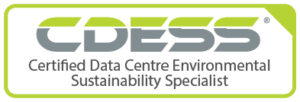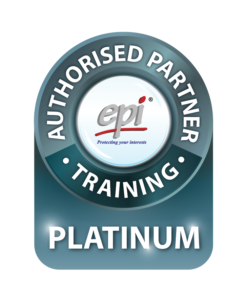

More data centres are being built, driven by the explosion of data and the processing power required for IoT (Internet of things) sensors and AI (Artificial Intelligence). The percentage of total power consumption by data centres is growing in parallel. It has become vitally important that data centres are optimized for energy efficiency and designed for environmental sustainability.
The CDESS® course is aimed at providing knowledge of the standards and guidelines related to environmental sustainability, and how to move your data centre (existing or new) to a more environmentally sustainable design and operations.
BEST PRICE GUARANTEED!
The primary audience for this course is any IT, facilities or data centre professional who works in and around the data centre and has the responsibility to achieve and improve the efficiency and environmental sustainability, whilst maintaining the availability and manageability of the data centre.
Participants must have at least one to two years’ experience in a data centre or facilities environment. The CDCP is highly recommended. The CDESS will discuss data centre facility aspects and without the CDCP or equivalent knowledge, the participant may not be able to gain the full benefits of the CDESS® training.
After completion of the course the participant will be able to:
- Understand the impact of data centres on the environment
Describe the various environmental/energy management
standards - Understand the purpose and goals of the legally binding
international treaties on climate change - Implement various sustainable performance metrics and
how to use them in the data centre environment
Manage data centre environmental sustainability using
international standards - Set up the measurement, monitoring and reporting of
energy usage - Use power efficiency indicators in a variety of data centre
designs - Use best practices for energy savings in the electrical
infrastructure and in the mechanical (cooling)
infrastructure - Use best practices for energy savings for the ICT
equipment and data storage - Understand the importance of water management and
waste management - Understand the different ways to use sustainable energy
in the data centre - Get practical tips and innovative ideas to make a data
centre more sustainable
- Module 1 – Impact of Data Centres on the Environment
- Predictions in 2010
- Current situation
- Outlook and commitments - Module 2 – What is Environmental Sustainability
- The importance of sustainability
- Senior management commitment
- Environmental sustainability framework
- Sustainability policies
- Performance standards and metrics
- Information policies
- Transparency
- Awareness
- Service charging models - Module 3 – Environmental Management
- Environmental sustainability framework (ISO 14001)
- Standards and guidelines – ISO 50001 / ISO 30134
- Measurement and categories
- Baselining
- Trend analysis
- Reporting - Module 4 – Power Eciency Indicators
- Various eciency indicators
- Power Usage Eectiveness (PUE)
- PUE measurement levels
- Factors aecting PUE
- Measurement points and intervals
- PUE in mixed source environments
- Measuring PUE in a mixed-use building
- PUE reporting
- Impact of PUE after optimising IT load - Module 5 – Electrical Energy Savings (Electrical)
- Identifying the starting point for saving energy
- Sizing of power
- DC power
- Generators
- UPS systems
- Power Factor (PF)
- Energy savings on lighting - Module 6 – Electrical Energy Savings (Mechanical)
- Energy savings on the cooling infrastructure
- Temperature and humidity setpoints
- Various energy ecient cooling technologies
- Energy savings on the airow
- Liquid cooling
- Energy reusage
- PUE, ERE/ERF and Control Volume - Module 7 – Electrical Energy Savings (ICT)
- Procurement
- IT equipment energy eciency
- ITEEsv, SMPE, SMPO
- IT equipment utilisation
- Server virtualisation
- Open compute project - Module 8 – Electrical Energy Savings (Data Storage)
- Data management
- Data storage management
- Data storage equipment eciency - Module 9 – Water Management
- Water Usage Eectiveness (WUE)
- Improving WUE
- Water usage at the power generation source
- Energy Water Intensity Factor (EWIF) - Module 10 – Waste Management
- Waste management policies
- Life-cycle assessment (Cradle to the grave)
- 3 R’s for waste management
- Reduce
- Reuse
- Second-hand market
- Recycle - Module 11 – Sustainable Energy Usage
- Sustainable energy sources
- Power purchase agreements
- Energy attribute certicates
- Renewable Energy Factor (REF)
- Matching renewable energy supply and demand
- Sustainable energy storage
- Carbon trading - Module 12 – Automated Environmental Management Systems
- Use of AI and machine learning
- Load migration
- Data Centre Infrastructure Management (DCIM) solutions
The CDESS course is lectured by an EPI Certified Instructor using a combination of lectures and question-and-answer sessions to discuss participants’ specific needs and issues experienced in their own environment. Participants are able to tap into the trainer’s extensive experience to enable them to solve practical problems in their current environment, thus adding tremendous value.
CDESS course available in the following delivery methods:
- VILT – Virtual Instructor Led Training
- TOD – Training On Demand (Self-Paced)
Exam: Certified Data Centre Environmental Sustainability Specialist (CDESS®)
Attendees will take a 1-hour CDESS exam. The exam is 40 questions, multiple-choice, closed-book. The passing mark is 27 out of 40.
Attendees passing the exam will be awarded the internationally accredited and recognized 'Certified Data Centre Environmental Sustainability Specialist' (CDESS) certificate.
CDESS is globally accredited by EXIN, a fully independent exam and certification institute.
The CDESS certificate is valid for 3 years, after which recertification is required.

